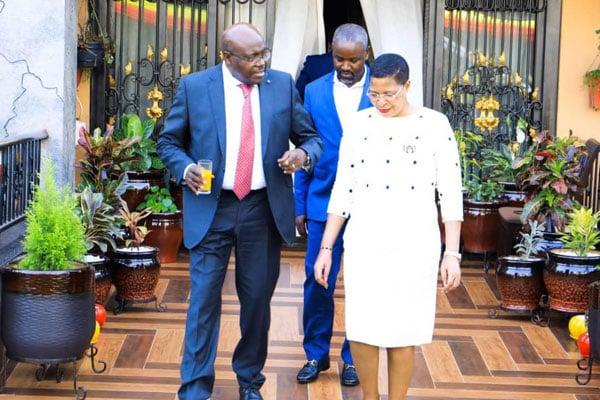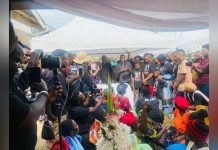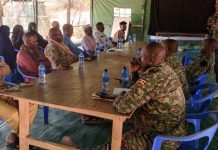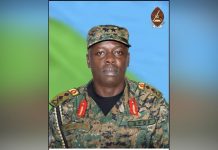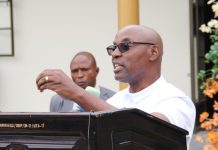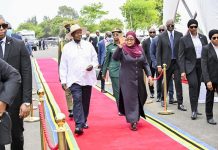Faridah N Kulumba
Africa-Press – Uganda. The representatives in the East African Legislative Assembly (EALA) were shocked after receiving news that their counterparts from the Democratic Republic of Congo (DRC) had boycotted a retreat of the members of the regional body that was held in Kampala, Uganda this week.
This followed the DRC representatives communicating to the Speaker of EALA, Mr. Joseph Ntakirutimana confirming that they would not be able to attend the committee sessions both in Rwanda and Uganda.
Reasons
According to Mr. Ntakirutimana, the DR Congo representatives boycotted the meeting due to the reason that they were concerned about their security while in Kampala. The same reason why they avoided entering Rwanda for the committee sessions.
The country is safe, Uganda assured
Uganda reacted to DR Congo’s boycott by giving assurance to the EALA legislators about the state of security in the country.
Mr. Stephen Odongo, a Ugandan representative in the EALA
tasked the Speaker of the Parliament of Uganda Anita Among to give a strong statement about the state of security of Uganda to inspire confidence in the DRC representatives.
Speaking about the matter of boycott, Ms. Among cautioned members against involvement in matters that do not concern them. “Don’t enter into wars that do not concern you,” she said.
DR Congo and Rwanda conflict
DR Congo last year severed relations with Rwanda as the former accused Kigali of providing material support to the M23 rebels who have captured swathes of territory around North Kivu Province.
The Western countries accuse Rwanda of reinforcing the rebels but Rwanda has vehemently denied the allegations.
This week on Wednesday Rwanda’s army reported that its troops briefly exchanged fire with soldiers from DR Congo at a border post, as tension continues to spike between the neighbors.
According to Rwanda 12 to 14 Congolese soldiers entered the neutral zone near the western district of Rusizi and opened fire at a Rwandan border post, which they called an act of provocation.
Rwanda said by the way of defending themselves their security forces fought the Congolese soldiers until they withdrew and that none of the Rwandan soldiers died.
However, DR Congo has denied entering the neutral zone. They said there were clashes between its military and a group of “bandits” near the border in Bukavu, but not with Rwandan troops.
More than 120 armed groups are operating across large swathes of eastern Congo, including M23 rebels, which the government of DR Congo has repeatedly accused Rwanda of supporting, but Rwanda denied the accusations.
The M23 staged a major offensive last year, seizing territory, forcing thousands of people from their homes, and sparking a diplomatic row between DR Congo and Rwanda. The M23 rebels, largely Congolese Tutsi militia, have seized swaths of territory across North Kivu province, edging toward the region’s main city of Goma.
Uganda and DR Congo’s relationship
The relationship between Uganda and the DR Congo government appears to have been warm since 2021 the two nations signed the Status of Forces Agreement, which has allowed the Uganda Peoples’ Defence Forces (UPDF) to hunt down the Allied Democratic Forces (ADF) rebel group in the jungles of Eastern DRC.
In April 2022, heads of state from the East African Community (EAC) including Uganda, Rwanda, Kenya, Burundi, Tanzania, South Sudan, and DR Congo agreed to establish a joint force led by Kenya to help restore peace and stability in Congo’s volatile North Kivu, South Kivu, and Ituri provinces.
This was not the first time Uganda interfered in DR Congo’s security affairs. Uganda first went to DR Congo in 1996 to support rebel groups fighting against the government of former President of Congo Joseph Desire Mobutu Sese Seko claiming that Congolese armed groups allied to his government were a threat to Uganda’s security.
After Mobutu was overthrown by his son Laurent Desire Kabira, The new president found himself in conflicts with his former allies, Uganda and Rwanda, whom he accused of supporting a planned coup. Kabira decided to expel all foreign forces including Uganda
In 1999, DR Congo petitioned the International Court of Justice (ICJ) accusing Uganda’s armed forces of destroying properties, lives, and natural resources when it invaded the country in 1998. DR Congo had asked for compensation of USD11bn but the judges dismissed several parts of the claim and decided on a far lower amount.
In February 2022, the United Nation’s highest court ruled that Uganda should pay DR Cong USD 225 million for loss of life, USD 40 million for damage to property, and USD 60 million for damage to natural resources. The ICJ ordered Uganda to compensate DRC USD 325 million in five annual installments of USD 65 million between 2022 and 2026, starting in September this year.
On 1st September 2022, the government of Uganda started payment of USD 325 million (about Shs 1.23 trillion) compensation to the Democratic Republic of Congo (DRC). The country paid the first annual installment of USD 65 million in reparation. The compensation is to be paid in five installments of USD 65 million, starting on September 1st and every September 1st for the following years.
For More News And Analysis About Uganda Follow Africa-Press

